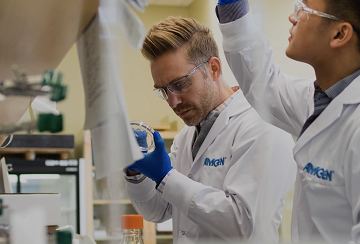

Meet Chris Murawsky. Chris is the Director of Research at Amgen British Columbia, and the head of the Domain Discovery and Immunization team. His previous experience, both in academia and in seeing the impact of his work on the patient side with his father’s cancer diagnosis, have helped shape his efforts in inspiring young minds and planting the seed of science education in local communities. Learn more about Chris’ story below.
My name is Chris Murawsky. I'm a director of research here at Amgen British Columbia, and I head the Domain Discovery and Immunization team. I got started at Amgen in 2010 and really came here by accident. I was on the academic path, going to start my own lab in the university and a friend of mine reached out to me and pointed out the opportunity and I interviewed and I've been here ever since.
My formal education started here at the University of British Columbia. I did my undergraduate degree in genetics, then went on to Cambridge University to do my Ph.D.
in molecular biology, and then a postdoctoral fellowship at the Salk Institute in San Diego. The transition for me from academia to working at Amgen was really driven by the opportunity to impact patients' lives directly. In academia, a lot of the time basic research feels very disconnected from the ultimate aim, which is improving patients lives. But at Amgen, that impact is much more direct.
One of the most interesting things that I've been a part of recently has been trying to figure out how to make the next generation of therapeutics. We've acquired a new platform that allows us to make so called multi-specific drugs. And so, these are drugs that can target more than one target. And so, this allows for all sorts of new biology to be impacted. I think this really is just the first steps into the next wave of new biologics that are going to come about.
The most fulfillment I get from my job is being able to visualize the connection from the things that we're doing every day in the lab and the ideas that people are coming up with, and the decisions that we're making, being able to see the end path for that potential molecule becoming a human therapeutic, and that's something that you just can't get enough of and I've been lucky enough to see that happen a few times.
I guess I got interested in science very early on. My father was a biology teacher for many, many years and so I was always around science. My father wrote a few books when I was a child, teaching other teachers how to teach or how to run field trips.
And so, he needed subjects for those books, and so my brother and I ended up being the primary subjects of those. He'd set us up doing experiments and take pictures of us doing it and we have these documented early days of us both being scientists.
My dad influenced me very much, always asking me,” Have you seen this? Have you thought about this?” And so just, you know, be comfortable with asking questions and not knowing, and I think that really piqued my interest that science was a method for getting to,
you know, the answers to unknown questions. While I was doing my PhD, my dad was diagnosed with prostate cancer. I've kind of seen full circle that… what the patient experience is and then what having access to medicines that can treat these diseases, what kind of benefit that has for them, and luckily he's fine and doing great today, but seeing my father go through his diagnosis and treatment really brought focus back to the work that we do and the importance of that and the potential for helping patients like my dad is a really powerful motivating force.
My father was very fortunate to have access to treatment options, but that… I realize that’s not something that is available to everyone in the world and certainly not here in B.C. So, it's something that I think that, you know, Amgen is really focused on and on improving and we're here to do whatever we can do to change that.
Amgen BC’s Chris Murawsky discusses the value of hands-on mentorship and the importance of investing in aspiring scientists. Learn how Amgen’s commitment to co-op programs and academic collaboration shapes careers and supports the broader life sciences community.
My name is Chris Murawsky. I am a director of research here at Amgen British Columbia, and I head the Domain Discovery and Immunization team. One of the best parts of my job is being a mentor.
Our co-op students, our postdoctoral fellows. These are going to be the scientists of the future and the scientists of tomorrow and I think having a solid foundation for that is an important role that we need to play.
It's important that Amgen invests back in the community, and one way to do that is through training the next generation of scientists, people that have an interest in science but maybe haven't quite started their career yet.
That's an opportunity for us to help mentor them through those early phases of their career, and I think ultimately that benefits Amgen, but it also benefits the local biotechnology ecosystem, and British Columbia in the long run. The co-op program is something that I'm really proud of, actually, and so we've developed that over many years since I've been around.
My role as a co-op mentor is different with every co-op, but ultimately my role is to help them with that… those early steps in their career, provide them with the resources that they need to answer some of their questions that they're interested in and then get out of their way in the lab and then support them when they leave for the rest of their career.
It's been really rewarding to see the career paths of the students that have left and to keep in touch with them, and they come back to visit every now and then. And it's been really rewarding to have that experience. One of the most important relationships that we have externally are with our local institutions, such as University of British Columbia. We interact with them on a regular basis through various programs, the co-op program being one of those, but also other scientific collaborations.
And so being able to share insight on various projects or leverage their expertise and vice versa, I think is a really important part of being part of the local scientific community here in British Columbia.
One of the advantages of being a scientist is that you can travel the world and gain experiences in different places, and so I was lucky enough to attend a very prestigious university and then be trained at one of the best institutes in the world and ultimately, you know, I always wanted to come back to British Columbia. This is where I grew up and this is where I would like to live and raise a family. So this is home for me.